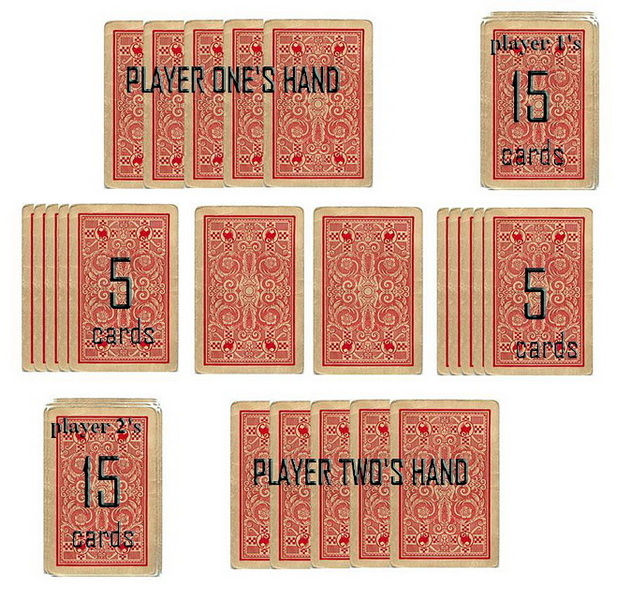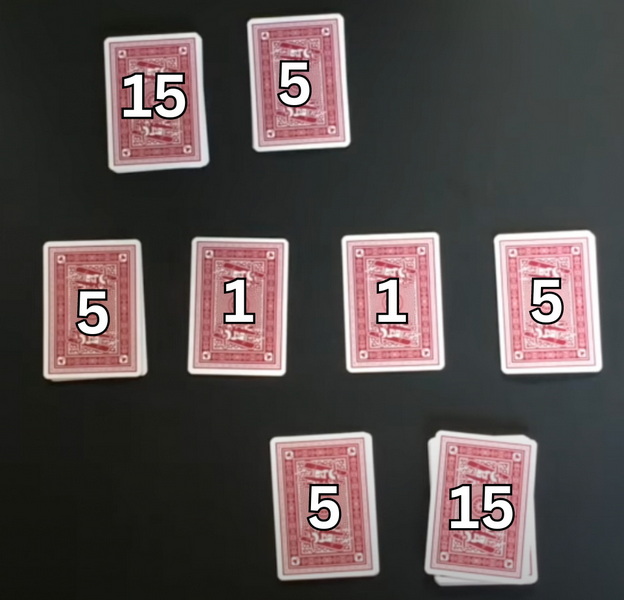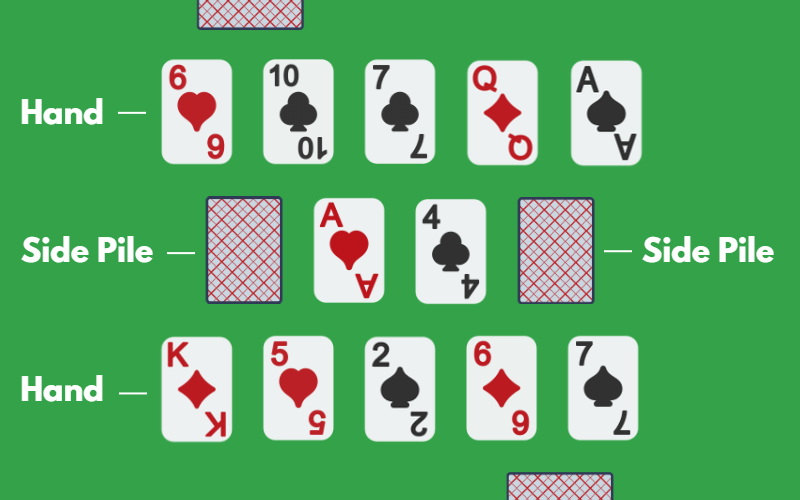Content Menu
● Overview of Speed
● Required Materials
● Setting Up the Game
>> Dealing the Cards
>> Player Positioning
● Rules of Speed
● Starting the Game
>> Playing Cards
>> Drawing Cards
>> Stalemate Situations
● Winning the Game
● Strategies for Success
● Variations of Speed
● Tips for Enhancing Your Gameplay Experience
● Conclusion
● Related Questions
>> 1. What are the basic rules of Speed?
>> 2. Can I play multiple cards at once in Speed?
>> 3. How do Aces work in Speed?
>> 4. What should I do if I can't make any moves?
>> 5. How many players can participate in Speed?
● Citations:
The Speed card game is a fast-paced, exciting game designed for two players. It requires quick reflexes and strategic thinking, making it a popular choice among card game enthusiasts. This article will guide you through the setup, rules, strategies for playing Speed, and tips for enhancing your gameplay experience, ensuring you are well-prepared for your next game night.

Overview of Speed
Speed is played with a standard 52-card deck and is suitable for players aged 6 and up. The objective of the game is simple: be the first player to get rid of all your cards. The game is characterized by its rapid pace, with players simultaneously playing cards from their hands onto the central piles.
The essence of Speed lies in its dynamic nature. Unlike many traditional card games where turns are taken sequentially, Speed demands that both players act at the same time, creating an exhilarating atmosphere filled with tension and excitement. This simultaneous action not only tests players' reflexes but also their ability to think strategically under pressure.
Required Materials
To play Speed, you will need:
- A standard 52-card deck (no jokers)
- A flat surface to play on
- Two players
Setting Up the Game
Setting up the Speed card game involves several steps:
Dealing the Cards
1. Shuffle the Deck: Begin by shuffling the entire deck of cards thoroughly to ensure randomness.
2. Deal Cards to Players: Each player is dealt a total of 20 cards divided into two piles:
- One pile contains 5 cards (the "hand" pile).
- The other pile contains 15 cards (the "stock" pile).
3. Prepare Central Piles: Place the remaining 12 cards in the center of the playing area to form four central piles:
- Two piles with 5 cards each (these will be your draw piles).
- Two piles with 1 card each (these will be your starting play piles).
Player Positioning
Players should sit across from each other, facing the central piles. Each player should keep their hand pile hidden from their opponent while being able to see the central piles clearly.
Rules of Speed
Understanding the rules is crucial for enjoying Speed:
Starting the Game
- Both players simultaneously flip over one card from each of the two single-card piles in the center.
- Players can start playing cards from their hand onto these face-up cards.
Playing Cards
- Players can play a card onto one of the middle piles if it is either:
- One rank higher or one rank lower than the card currently showing on that pile.
For example:
- If there is a 5 showing, you can play a 4 or a 6.
- Aces can be played on both Kings and 2s.
Drawing Cards
- After playing a card, players must draw a new card from their stock pile to maintain a hand of five cards at all times.
- If a player plays multiple cards in succession, they must draw an equal number from their stock pile.
Stalemate Situations
- If neither player can play any cards, both players flip over one card from their respective 5-card piles in the center.
- If these piles are exhausted, shuffle all used central cards and create new central piles.

Winning the Game
The first player to play all their cards from their hand and shout "Speed!" wins the game. It's essential to stay alert and quick during gameplay since both players are trying to outpace each other continuously.
Strategies for Success
To excel at Speed, consider these strategies:
- Card Management: Keep your hand organized by grouping similar ranks together for quicker access during play. For instance, if you have multiple cards of adjacent ranks (like 4s and 5s), keeping them together can help you make faster decisions.
- Observe Your Opponent: Pay attention to what your opponent plays; this can give you insight into which cards they may have left. If they seem to be holding onto certain ranks, it might be beneficial to play those ranks quickly before they do.
- Practice Quick Reflexes: Since Speed is about speed, practice makes perfect! The more you play, the quicker you'll become at spotting opportunities.
- Use Psychological Tactics: Sometimes bluffing or feigning confidence can throw off your opponent's rhythm. For example, if you make quick moves but have no playable cards left, your opponent might hesitate or second guess themselves.
Variations of Speed
While traditional Speed follows specific rules, several variations exist that can alter gameplay:
- Doubles Variation: Players may also play a card equal in value to the face-up card (e.g., if a 7 is showing, you can play another 7). This variation can add an additional layer of strategy as players must consider more potential plays.
- Multiple Card Play: Some variations allow players to play several consecutive cards if they follow in rank order (e.g., if you have 5, 6, 7, and an 8 when a 4 is showing). This rule encourages players to think ahead about how many cards they might be able to play in one turn.
Tips for Enhancing Your Gameplay Experience
To make your experience with Speed even more enjoyable:
- Establish House Rules: Before starting your game, agree on any house rules or variations you'd like to include. This could involve how many rounds you'll play or specific variations that everyone agrees upon.
- Create a Comfortable Environment: Ensure that your playing area is free from distractions and comfortable for both players. Good lighting and an uncluttered space can enhance focus and enjoyment.
- Take Breaks Between Rounds: If you're planning on playing multiple rounds or having a game night featuring various games, take short breaks between rounds to refresh your mind and maintain high energy levels throughout your gaming session.
Conclusion
Speed is an exhilarating card game that combines strategy with quick thinking and reflexes. By following this guide on how to set up and play Speed along with various strategies and tips for enhancing gameplay, you'll be well-equipped for your next gaming session with friends or family. Remember that practice enhances your speed and strategy; don't hesitate to play multiple rounds! The thrill of competition paired with strategic depth makes Speed a timeless classic that continues to entertain players across generations.

Related Questions
1. What are the basic rules of Speed?
The basic rules include dealing 20 cards to each player in two piles (5 and 15), playing cards onto central piles based on rank (one higher or lower), drawing new cards after each play, and shouting "Speed!" when you have no cards left.
2. Can I play multiple cards at once in Speed?
In most traditional versions of Speed, players are only allowed to play one card at a time unless you are playing a variation that permits multiple plays.
3. How do Aces work in Speed?
Aces can be played on both Kings and 2s, creating a looping sequence where they act as both high and low cards.
4. What should I do if I can't make any moves?
If neither player can make any moves, both players flip over one card from their respective side piles until new moves become available.
5. How many players can participate in Speed?
Speed is designed for two players only; however, variations or similar games may accommodate more players.
Citations:
[1] https://www.youtube.com/watch?v=jk1SYPCCFn4
[2] https://vipspades.com/blog/speed-card-game-rules/
[3] https://content.instructables.com/F10/K8L6/I7L6N53Y/F10K8L6I7L6N53Y.jpg?auto=webp&fit=bounds&frame=1&height=150&width=1024auto%3Dwebp&sa=X&ved=2ahUKEwi35MLmncWKAxXpITQIHTmqEPoQ_B16BAgEEAI
[4] https://cardgames101.com/learn-to-play-the-card-game/speed
[5] https://www.instructables.com/How-to-play-speed-card-game/
[6] https://www.youtube.com/watch?v=r-V1aJI6we4
[7] https://playingcarddecks.com/blogs/how-to-play/speed-game-rules
[8] https://en.wikipedia.org/wiki/Speed_(card_game)
































